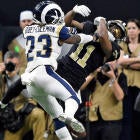When we look back at the "no-call seen around the world," it will only have had an effect on the 2019 season -- not the NFL at large. On Thursday, it was announced that the NFL would not move forward with pass interference replay review for the 2020 season.
The rule was implemented last offseason after the New Orleans Saints were bounced from the postseason almost entirely because of one play. The Saints and Los Angeles Rams were tied at 20 apiece with under two minutes remaining in the fourth quarter of the NFC Championship game. Drew Brees dropped back and attempted to throw a pass to Tommylee Lewis, who was knocked down by cornerback Nickell Robey-Coleman before the ball reached him. It was a clear and obvious penalty, but the officials somehow missed it. Since that play occurred on third down, the Saints were forced to kick a field goal instead of receiving a first down at about the Rams' 6-yard line with what should have been a defensive pass interference penalty. The Saints could have run down the clock or maybe even put the game away with a touchdown, but instead the Rams kicked a field goal in overtime to head to Super Bowl LIII.
As for why the NFL is ditching the one-year pass interference rule, chairman of the competition committee Rich McKay explained the decision during an interview with SiriusXM NFL Radio.
"Nobody is putting forward the OPI/DPI review again so that dies a natural death," said McKay. "In my opinion, we were trying to apply something that we've always been fearful of. We didn't know what the total outcome would be, but we were always fearful of putting a totally subjective play into replay.
"The majority of replays is objective and what I mean by that is that it's a line. 'Did the ball cross the plane or not? Did the ball touch the ground or not? Were two feet in or not?' There's a lot of objective lines involved and it's an objective review. When we go into subjective, which is, 'Was this enough for a foul? Did he grab him enough? Was the restriction enough?'
"We knew there would be problems, because your subjectivity and my subjectivity on a particular reviewable play can easily be different. The fact that whether a ball was caught or not caught -- we might disagree once in a 100 (times), but about 99 percent of the time we are going to agree because we can see it on replay. That's not true in a subjective world, so I think when you did what we did which was try to catch that really egregious big-time play and put that standard of clear and obvious, even then, I think you're adding a subjective standard to a subjective play and I think we set ourselves up for not having agreement on results, and I think that showed itself during the year."
The rule truly did not make as much of a difference on the game as we all expected. It wasn't often that the league went back on their original ruling once the challenge flag was thrown. Plus, McKay does make a great point about subjectivity. Virtually every pass interference call is subjective, so it almost came down to your opinion on the matter. It made for a very tough call in most cases.
As for the rule changes the NFL is considering this offseason, check out a list of them here.

















